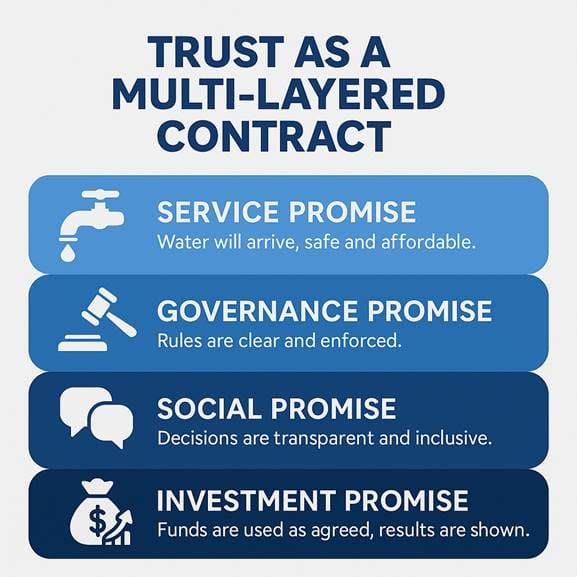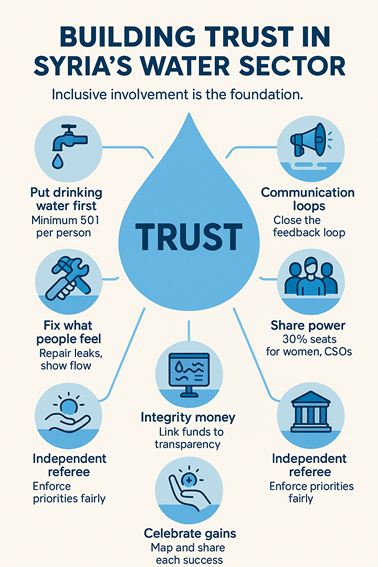A nation can survive shattered pipes and parched fields, but not the drought of public trust.

Syria’s water debate has reached a historic fork. One path calls for an independent national authority that finally untangles the clashing mandates of several ministries and scores of local councils involved in managing water. The other champions a Water-Energy-Food-Ecosystems (WEFE) nexus approach that forces every sector to put its card (volumes, kilowatt-hours, crop yields, and ecological flows) on the table. Some see an either-or choice. In reality, the only route out of scarcity and suspicion is to fuse these ideas into a single operating system for building trust and ensuring water justice.
In this discussion “trust” is not a vague feeling, it is a governance asset that can be defined, broken down into concrete elements, and (at least roughly) measured.
Why is trust the first drop?
Social‑science literature describes trust as “an individual’s belief in, and willingness to act on the basis of, the words, actions, and decisions of another.” In a service system like water supply, that definition maps onto three questions every stakeholder silently asks. People judge water institutions on competence (can you do the job?), integrity (will you play fair?), and openness (will you listen to me?). The OECD groups those attributes into two overarching drivers- Competence and Values- and breaks them down further into responsiveness, reliability, openness, integrity, and fairness.
Decades of conflict, an earthquake and blackout-ridden summers have left Syrians wondering whether the next turn of the tap will bring water, air or mud. Years of war and blackouts have broken pumps and shattered confidence. A faucet that hisses with air is a daily reminder that institutions should not only promise, they must deliver. Rebuilding pipes without rebuilding trust would be like filling a cracked reservoir
Justice means re-balancing the ledger.
Today households consume barely 13% of national withdrawals while agriculture gulps 87%, yet two-thirds of urban pipes leak before water reaches the meter. Shifting a mere 15% of irrigation demand to drip irrigation and sprinklers, while slashing non-revenue water in the big cities, would unlock enough supply to guarantee the first 50 liters per person per day and still keep farmers productive.
Justice also demands voice: at least 30% of seats on basin councils and water-user associations must go to women, displaced people, and civil-society groups who have long borne the brunt of scarcity without having a say. Trust is a shared asset, so every group that shapes (or depends on) service performance has a legitimate role. The OECD’s governance indicator framework even defines trust as the product of an inclusive process where “stakeholders are properly engaged” at every level of decision‑making.
- Core service actors : keep the water flowing
These “front‑line” bodies are the first to win or lose public confidence, so they must anchor any trust strategy.
|
Actor |
Why
they matter |
Typical
trust lever |
|
Municipal
& regional utilities |
They
run the networks, read the meters, issue the bills. |
Publish
operational data, run grievance hot‑lines, show leak‑repair KPIs. |
|
Local
water boards / user associations |
Provide
day‑to‑day voice for neighbourhoods or irrigation schemes. |
Co‑decide
investment priorities; verify service hours. |
|
Private
operators & contractors |
Increasingly
used for O&M or turn‑key projects. |
Transparent
contracts, service‑level agreements, joint audits. |
- Accountability & oversight bodies : guard the rules
- Economic and environmental regulators (tariff approval, water‑quality standards)
- Supreme audit institutions/anti‑corruption agencies
- Parliaments & local councils (vote budgets and laws)
By enforcing integrity and fairness, they deliver the values dimension of trust.
- Voice & inclusion actors : make the system feel fair
The OECD survey found these constituencies are still underrepresented in formal water decisions, yet their early involvement strongly predicts later compliance and payment rates.
|
Group |
Special
contribution |
|
Civil‑society
organisations, community‑based organisations, social movements |
Mobilise
users, spot inequities, co‑monitor projects. |
|
Media
& digital civic‑tech platforms |
Turn
raw data into stories the public understands. |
|
Women,
youth, minority & disability groups |
Highlight
barriers that “average” consultations miss. |
4. Knowledge & technical partners : close the competence gap
- Universities and research institutes: develop risk models and water‑quality methods.
- Engineering consultants & professional associations: codify standards, peer‑review designs.
- Open‑data communities: build dashboards and open APIs that let everyone check the numbers.
Competence (reliability, technical ability) is the second half of trust; these actors supply it.
5. Finance & investment partners : reward credible behaviour
|
Actor |
Trust incentive |
|
Multilateral & bilateral donors, development banks |
Link disbursement to fiduciary safeguards and citizen‑engagement
milestones. |
|
Commercial lenders & impact investors |
Price loans according to utility governance and
disclosure scores. |
|
Insurance & guarantees |
Offer blended finance when accountability systems
reduce perceived risk. |
The World Bank’s Utility of the Future program stresses “articulating key stakeholders to bring together capabilities, expertise, and resources” as a precondition for sustainable investment.
- Transboundary & cross‑sector neighbors: contain external risk
- Upstream/downstream countries or provinces: joint flow monitoring, drought rules.
- Agriculture, energy, and industry users: coordinate abstraction licenses and pollution control.
Trust collapses quickly if one party can upend the system beyond the utility’s control, so basin‑wide cooperation is non‑negotiable.

Putting it all together; think of trust as a multi‑layered contract:
- Service promise (utility ↔ user): “Water will arrive, safe and affordable.”
- Governance promise (government ↔ provider): “Rules are clear and enforced.”
- Social promise (community ↔ sector): “Decisions are transparent and inclusive.”
- Investment promise (finance ↔ sector): “Funds are used as agreed, and results are shown.”

is inclusive communication enough to build trust in the water sector in Syria?
Short answer: No. Inclusive communication is indispensable in Syria’s water sector, but it will only seed trust. For that seed to grow, you also need demonstrable service reliability, integrity controls, and responsive grievance‑handling.
Why communication is necessary …but not sufficient
|
What
inclusive communication can do |
What
it cannot do on its own |
|
• gives
every group – women, idps, people with disabilities – timely, two‑way channels to ask questions and shape
decisions. |
• fix
a leaky main, raise chlorine residuals or keep pumps running during a
blackout. Users still judge trust largely by performance and water quality. |
|
• signals
openness and respect, which oecd research shows is one pillar of “trust &
engagement.” |
• guarantee
integrity, affordability or equitable pressure zones; those depend on sound
finance, procurement and oversight. |
|
• counters
rumours and reduces the information vacuum that fuels distrust in a conflict‑sensitive environment. |
• solve
corruption complaints or billing disputes unless the utility also has
enforceable rules, audits and an ombudsman. |
Evidence from Syria
A 2023–24 study of earthquake‑hit Northwest Syria found that people liked receiving updates through WhatsApp and face‑to‑face sessions, yet they still “expressed dissatisfaction with the considerable delays between communicating queries and receiving responses… Influence does not equate with trust; trust is shaped by track record and technical expertise.” Insecurity Insight
What happens if you do only communication?
- Short‑term goodwill rises , but if the next promised water‑truck or mains repair fails to appear, disappointment turns to cynicism faster than before.
- Expectations escalate beyond operational capacity, widening the “say–do” gap.
- Donors and private lenders still price in governance risk because openness without controls does not mitigate misuse of funds.
Bottom line: Inclusive, two‑way communication is the entry ticket to trust‑building in Syria’s water sector. The seat you buy with that ticket is kept only by pairing words with steady flow, safe quality, fair tariffs, and visible accountability.

Eight moves that turn promises into proof, and proof into public trust
- Put drinking water first, and prove it
Justice starts when every Syrian sees that the first 50 liters per person per day are guaranteed. The new/ updated Water Law must lock in that right, and a “National Water Authority” should publish real-time dashboards showing how much of each source is reserved for households before farms or factories. - Fix what people feel
Citizens judge competence by the water that reaches the tap. Target quick wins—leak repair, chlorine dosing, solar backup—and livestream progress. Each neighbourhood that sees pressure rise credits the system with reliability. - Turn microphones into megaphones
Hotlines, WhatsApp groups and roving town halls keep conversation two-way. The closure loop matters most: every complaint gets a time-stamped answer. When people see a voice note change a valve setting, scepticism softens. - Share power, not just data
Reserve 30 % of seats on basin councils and water-user groups for women, youth and civil society. Let them vote on budgets, tariffs and drought plans—and publish the roll call. Each inclusive decision is a public contract. - Link money to integrity
Reconstruction funds will flow only when tenders, beneficial owners and audit results are posted online. Visible accounting turns integrity from aspiration to habit. - Install an independent referee
A stand-alone authority, insulated from day-to-day politics yet answerable to parliament, can enforce the priority ladder and set fair tariffs without fear. Arm’s-length status reassures donors and citizens alike: rules apply to all. - Use the WEFE lens to avoid zero-sum traps
Trust collapses if yesterday’s promise to cities means today’s loss for farmers. Annual Water-Energy-Food-Ecosystem balance sheets force transparent trade-offs: every cubic metre saved through drip irrigation must be earmarked for urban taps. - Celebrate each gain
Trust grows by increments: a repaired main, a chlorine-test video, a farmer-run drip plot. Map them, film them, upload them. Stories turn scattered fixes into a national arc people can defend
Each extra liter that reaches a kitchen sink, each spreadsheet row made public, and each woman seated at the council table is a brick in the dam of confidence. Patch by patch, those bricks can turn a trickle of belief into a reservoir large enough to power Syria’s recovery.
Trust will not trickle down; it will rise where Syrians plant it. The choice is still ours: start now.